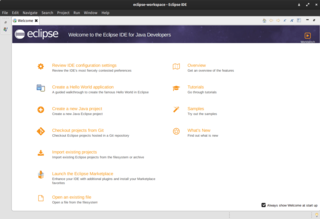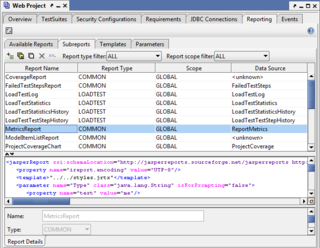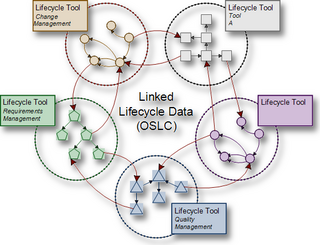
OSGi is an open specification and open source project under the Eclipse Foundation.

Jakarta EE, formerly Java Platform, Enterprise Edition and Java 2 Platform, Enterprise Edition (J2EE), is a set of specifications, extending Java SE with specifications for enterprise features such as distributed computing and web services. Jakarta EE applications are run on reference runtimes, which can be microservices or application servers, which handle transactions, security, scalability, concurrency and management of the components they are deploying.

Eclipse is an integrated development environment (IDE) used in computer programming. It contains a base workspace and an extensible plug-in system for customizing the environment. It is the second-most-popular IDE for Java development, and, until 2016, was the most popular. Eclipse is written mostly in Java and its primary use is for developing Java applications, but it may also be used to develop applications in other programming languages via plug-ins, including Ada, ABAP, C, C++, C#, Clojure, COBOL, D, Erlang, Fortran, Groovy, Haskell, HLASM, JavaScript, Julia, Lasso, Lua, NATURAL, Perl, PHP, PL/I, Prolog, Python, R, Rexx, Ruby, Rust, Scala, and Scheme. It can also be used to develop documents with LaTeX and packages for the software Mathematica. Development environments include the Eclipse Java development tools (JDT) for Java and Scala, Eclipse CDT for C/C++, and Eclipse PDT for PHP, among others.
The rational unified process (RUP) is an iterative software development process framework created by the Rational Software Corporation, a division of IBM since 2003. RUP is not a single concrete prescriptive process, but rather an adaptable process framework, intended to be tailored by the development organizations and software project teams that will select the elements of the process that are appropriate for their needs. RUP is a specific implementation of the Unified Process.
In software testing, test automation is the use of software separate from the software being tested to control the execution of tests and the comparison of actual outcomes with predicted outcomes. Test automation can automate some repetitive but necessary tasks in a formalized testing process already in place, or perform additional testing that would be difficult to do manually. Test automation is critical for continuous delivery and continuous testing.

StarTeam is a version control system used in software development, especially when a project involves multiple teams in different locations. StarTeam is an SCM and SDLC software application, created by Starbase Corporation, which was acquired by Borland in January 2003 which was acquired by Micro Focus in July 2009 and later acquired by OpenText in 2023. The application is client-server, backed by a relational database that retains all changes made to a project during its evolution as well as the project requirements, task assignments, threaded discussions and bug tracking. Microsoft SQL Server and Oracle database are supported database servers.
Mobile app development is the act or process by which a mobile app is developed for one or more mobile devices, which can include personal digital assistants (PDA), enterprise digital assistants (EDA), or mobile phones. Such software applications are specifically designed to run on mobile devices, taking numerous hardware constraints into consideration. Common constraints include CPU architecture and speeds, available memory (RAM), limited data storage capacities, and considerable variation in displays and input methods. These applications can be pre-installed on phones during manufacturing or delivered as web applications, using server-side or client-side processing to provide an "application-like" experience within a web browser.
Model-driven engineering (MDE) is a software development methodology that focuses on creating and exploiting domain models, which are conceptual models of all the topics related to a specific problem. Hence, it highlights and aims at abstract representations of the knowledge and activities that govern a particular application domain, rather than the computing concepts.

SoapUI is an open-source web service testing application for Simple Object Access Protocol (SOAP) and representational state transfers (REST). Its functionality covers web service inspection, invoking, development, simulation and mocking, functional testing, load and compliance testing. A commercial version, ReadyAPI, which mainly focuses on features designed to enhance productivity, was also developed by Eviware Software AB. In 2011, SmartBear Software acquired Eviware.
This is a comparison of notable free and open-source configuration management software, suitable for tasks like server configuration, orchestration and infrastructure as code typically performed by a system administrator.
AnthillPro is a software tool originally developed and released as one of the first continuous integration servers. AnthillPro automates the process of building code into software projects and testing it to verify that project quality has been maintained. Software developers are able to identify bugs and errors earlier by using AnthillPro to track, collate, and test changes in real time to a collectively maintained body of computer code.
PTC IntegrityLifecycle Manager is a software system lifecycle management (SSLM) and application lifecycle management (ALM) platform developed by MKS Inc. and was first released in 2001. The software is client/server, with both desktop (java/swing) and web client interfaces. It provides software development organizations with a environment in which they can manage the end-to-end processes of development.

Open Services for Lifecycle Collaboration (OSLC) is an open community, originally proposed in 2008, to define a set of specifications that enable integration of software development. It has evolved, and continues to evolve, to areas such as Application Lifecycle Management (ALM), Product Lifecycle Management (PLM), IT Operations and more. The intention is to make life easier for tools users and tools vendors, by making it easier for tools to work together.

iDempiere. Community Powered Enterprise, also known as OSGi + ADempiere, is an open source Enterprise Resource Planning (ERP) software that is fully navigable on PCs, tablets and smartphones, it also has customer relationship management (CRM) and supply chain management (SCM) functions. It is in contrast to proprietary or most other open source ERP solutions driven only by a community of supporters.
Robotic process automation (RPA) is a form of business process automation that is based on software robots (bots) or artificial intelligence (AI) agents. RPA should not be confused with artificial intelligence as it is based on automotive technology following a predefined workflow. It is sometimes referred to as software robotics.

Katalon Platform is an automation testing software tool developed by Katalon, Inc. The software is built on top of the open-source automation frameworks Selenium, Appium with a specialized IDE interface for web, API, mobile and desktop application testing. Its initial release for internal use was in January 2015. Its first public release was in September 2016. In 2018, the software acquired 9% of market penetration for UI test automation, according to The State of Testing 2018 Report by SmartBear.







